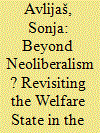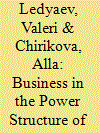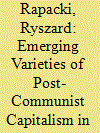| Srl | Item |
| 1 |
ID:
171702


|
|
|
|
|
| Summary/Abstract |
Scholars of political economy have criticised the Baltic states’ transition to capitalism as socially ‘disembedded’ and shaped by a zealous form of neoliberalism. This article argues that the Baltic welfare states have experienced a more complex post-socialist transformation than suggested by the ‘neoliberal retrenchment’ narrative, which relies on the traditional definition of the welfare state and focuses solely on cash compensation for the ‘losers’ of transition. By uncovering higher investment in education, more generous labour market policies and a larger expansion of public sector employment than in the Visegrád countries, the article uncovers social investment oriented welfare states in the Baltic.
|
|
|
|
|
|
|
|
|
|
|
|
|
|
|
|
| 2 |
ID:
171704


|
|
|
|
|
| Summary/Abstract |
This article is based on the outcomes of a research project conducted in five small Russian towns. In all the communities, big business had significant power potential, but its direct involvement in local politics was limited since the ‘power vertical’ instituted under Putin meant that decisions on the most important local issues were made at regional and federal levels. Small and medium-sized businesses were also not actively involved in local politics. Unlike big business, however, they were more vulnerable to and dependent on local administrations. Relations between local authorities and business actors seemed close and cooperative; however, their interactions often had no civic component and were based almost exclusively on mutual interest.
|
|
|
|
|
|
|
|
|
|
|
|
|
|
|
|
| 3 |
ID:
171700


|
|
|
|
|
| Summary/Abstract |
The aims of the present article are three-fold. First, we conduct a survey of the most representative theoretical and empirical research on the emerging varieties of post-communist capitalism in Central and Eastern Europe. We critically review standard conceptual frameworks, their applications and derivatives, and non-standard approaches. Second, we highlight the major peculiarities of institutional development in CEE countries that make the direct application of both standard and non-standard theoretical frameworks problematic. Finally, we outline the possible directions of future research on the emerging models of post-communist capitalism and suggest essential extensions to the methodology involved.
|
|
|
|
|
|
|
|
|
|
|
|
|
|
|
|
| 4 |
ID:
171703


|
|
|
|
|
| Summary/Abstract |
In the past five years, the funding environment for nongovernmental organisations (NGOs) and social projects in Russia has changed dramatically. The most publicised developments involve government actions to restrict funding by Western donors. Less documented has been the transformation of the indigenous funding environment for civil society and how demand-driven strategies may better support civil society development in Russia than sceptics assume. Using evidence gathered in 2016–2018, we provide an overview of how NGOs targeted as foreign agent organisations responded to their status, how funding opportunities for NGOs in Russia have changed, and how Russian organisations are sustaining themselves financially.
|
|
|
|
|
|
|
|
|
|
|
|
|
|
|
|
| 5 |
ID:
171705


|
|
|
|
|
| Summary/Abstract |
Drawing on 69 interviews and information from the World Values Surveys, we examine discursive understandings of social capital in Romania. We evidence two dominant explanatory metanarratives on the weakness of social capital (‘communism’ and ‘ethnocentric individualism’) and dilemmas regarding generational and urban/rural differences, which our mixed-methods approach helps decode. Contemporary processes of institutionalisation and commodification have further weakened practices of social capital but such processes are socially approved for their potential of breaking with lingering practices of corruption, bribery and favouritism, and of achieving institutional fairness. Convergence with mature democracies is unlikely not because of passive legacies or ill-adapted actors but because people have different aspirations, well suited to the context of post-communist transformation.
|
|
|
|
|
|
|
|
|
|
|
|
|
|
|
|
| 6 |
ID:
171687


|
|
|
|
|
| Summary/Abstract |
Displacement can take many different forms. Beyond the local specificities of each case, there are also distinctive legal categories capturing different dynamics. UNHCR started recording the figures of internally displaced people (IDPs) systematically only after the end of the Cold War. Over the last decade, the number of IDPs has increased rapidly. Of the estimated 68.5 million forced migrants globally in 2017 (UNHCR 2018), about two thirds were IDPs and one third refugees crossing international borders. On the whole, however, IDPs tend to attract less international attention than refugees who become a political, legal or social policy issue by crossing interstate borders.
|
|
|
|
|
|
|
|
|
|
|
|
|
|
|
|
| 7 |
ID:
171701


|
|
|
|
|
| Summary/Abstract |
The article explores the Russia–Ukraine crisis of 2014 in the context of post-communist nationalism and the disintegration of the post-Soviet space. The focus is on the politicisation of the ethno-linguistic divide and historical narratives in the interplay between Russia’s determination to control Ukraine’s political future and Ukraine’s resolve to free itself from Russian influence. In highlighting the incompatibility between Russian and Ukrainian nationalising projects, it is argued that while the Ukrainian crisis is not an ethnic conflict per se, nationalism was a significant contributory factor in fuelling the conflict and remains a relevant obstacle to its resolution.
|
|
|
|
|
|
|
|
|
|
|
|
|
|
|
|